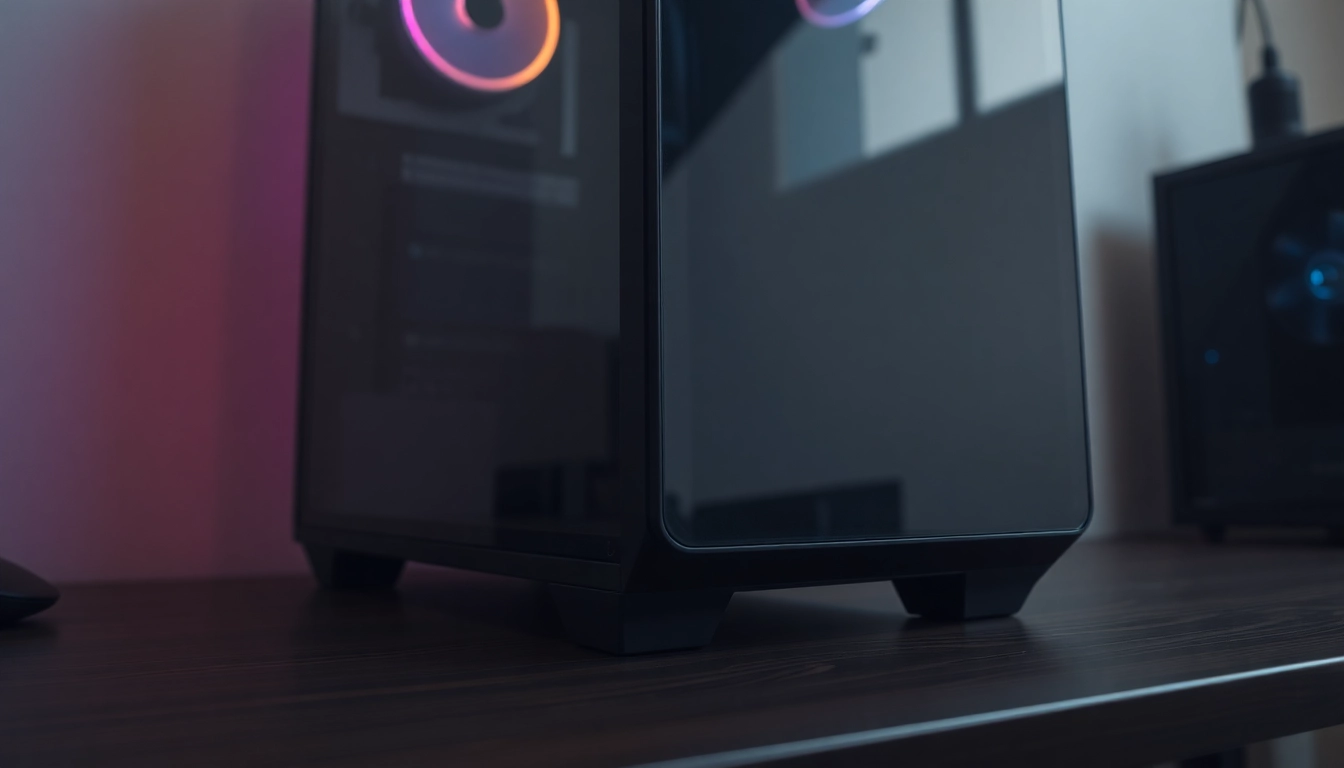Understanding the Importance of a Quality PC Case
In the world of personal computing, the case is more than just a protective shell for your components; it serves as the foundation for your setup. A high-quality PC CASE Supplier understands the nuances that go into the design and function of these essential components. Whether you are a gaming enthusiast, a professional designer, or a casual user, the choice of a computer case can significantly impact both performance and aesthetics.
The Role of a PC CASE Supplier in Gaming Builds
The role of a PC case supplier extends beyond just providing a product; they influence the entire build process of a PC. An effective supplier offers not only a selection of cases but understands the compatibility of various components, airflow dynamics, and the latest trends in case design. Matters like material quality, build durability, and aesthetic appeal become crucial factors for gamers who often invest heavily in their rigs. The right supplier can guide customers towards making informed decisions that best suit their needs.
Key Features to Look for in a PC Case
When evaluating which PC case to select, there are several key features to consider:
- Airflow: Efficient ventilation is critical to maintain optimal performance and temperature. Look for cases with ample fan slots and mesh panels.
- Size and Form Factor: Ensure that the case is compatible with the components you intend to use, such as the motherboard and GPU. Mid-tower, full-tower, and compact designs each have specific use cases.
- Build Quality: Solid construction materials, like tempered glass and aluminum, not only enhance durability but also appeal visually.
- Cable Management: Effective cable management systems keep the interior tidy, enhance airflow, and make it easier to build and upgrade.
- Expansion Options: Look for cases that provide space for future upgrades—extra slots for SSDs, additional cooling systems, or compatibility with liquid cooling solutions can greatly enhance a system’s lifespan.
How a Good PC Case Enhances Performance
A good PC case can significantly enhance your system’s performance by facilitating better cooling and airflow. Many modern CPUs and GPUs generate substantial heat, and without adequate ventilation, performance can degrade sharply, leading to thermal throttling where components slow down to prevent damage. Elevated temperatures can also shorten the lifespan of your hardware. Additionally, a well-designed case reduces noise levels by incorporating sound dampening materials, which is particularly beneficial for those in shared spaces or who are sensitive to sound when gaming or working.
Types of PC Cases Available in the Market
Mid-Tower vs Full-Tower: What’s Best for You?
Choosing between a mid-tower and full-tower case often hinges on the user’s needs and preferences. Mid-tower cases are versatile and suitable for a wide range of builds, making them popular among gamers and PC builders. They provide ample room for storage and decent airflow while remaining relatively compact.
Full-tower cases, on the other hand, offer more room for components, making them ideal for high-end gaming setups and workstation builds that require extensive cooling and multiple GPUs. They tend to support more fans and larger radiators, which is crucial for high-performance tasks like video editing or 3D rendering.
Micro ATX Cases: Compact Solutions
Micro ATX cases cater specifically to users who need a more compact solution without sacrificing power. They are an excellent option for those with limited space or who want a portable setup. The main consideration when opting for Micro ATX is ensuring that cooling solutions are effective, given the confined space. Many modern Micro ATX cases come equipped with effective airflow designs and can easily house powerful components.
Unique Designs: Custom and Themed PC Cases
Unique stylistic choices are increasingly common in the PC case market. Whether it’s RGB lighting, tempered glass panels, or intricate designs that evoke themes from gaming franchises, customization has become a core aspect of PC building culture. Users can find cases designed to reflect their personality or match their gaming setup, making the choice of a case a form of personal expression as much as a practical decision.
Top Brands to Consider When Choosing a PC CASE Supplier
Overview of Leading PC Case Manufacturers
Several brands dominate the PC case supply landscape, each offering unique features and attributes. Leading brands like Corsair, Thermaltake, Lian Li, and NZXT provide a diverse range of options suited to different user tastes and requirements. Corsair is known for its innovative designs and exceptional cooling solutions, making it a go-to for performance-oriented builds. Thermaltake emphasizes aesthetic designs alongside functionality, while Lian Li is lauded for its premium aluminum cases that blend form with function.
Comparing Quality and Aesthetics of Popular Brands
While the primary focus of a PC case should be its functional aspects—like airflow and thermal management—quality and aesthetics play a crucial role in the decision-making process. A case from a well-established brand typically offers higher quality materials and better build quality. Users often report that higher-end brands have a more polished finish, favorable cable management features, and superior thermal performance. When comparing brands, it’s essential to look at reviews and user feedback to gauge real-world performance.
Customer Reviews and Expert Recommendations
Before making a final decision, prospective buyers should extensively research customer reviews and expert recommendations. Websites such as TechRadar and Tom’s Hardware often provide comprehensive analyses of popular models, highlighting both pros and cons. Customer reviews can give potential buyers insights into user experience and reliability that specifications may not convey. This conversational aspect not only guides choices but can also help in identifying common issues with specific models.
DIY PC Building: Selecting Your Components
How to Match Your PC Case with Hardware Specifications
Matching your PC case with your hardware specifications is a vital step in the building process. The compatibility of the components, such as the motherboard size (ATX, Micro ATX, or Mini ITX) and GPU length, will dictate your case choice. A careful balancing of all components is necessary to ensure effective performance. Consider measuring the dimensions of your components and comparing them to the specifications listed for the case you’re considering.
Important Considerations for Cooling Solutions
Effective cooling solutions—Air and Liquid cooling—are critical for maintaining performance. Most cases will specify how many fans they can accommodate, and many will also indicate the sizes (120mm, 140mm, etc.) that can fit. Liquid cooling setups require additional space and mounting capabilities, so it’s essential to ensure the chosen case supports such configurations. Additionally, researching compatibility with specific coolers can prevent future challenges and enhance your overall build experience.
Tips for Cable Management and Aesthetics
Good cable management not only looks clean but also helps maintain airflow and cooling efficiency. Most PC cases provide cable routing options, including tie-down points and channels, to help manage cables neatly. Investing time in proper cable management can make a significant difference in cooling performance and aesthetic impressions. Tidy cabling can also make building or upgrading your PC easier and less stressful.
Where to Buy: Finding Reliable PC CASE Suppliers
Online Marketplaces vs. Local Retailers
When it comes to purchasing a PC case, the decision between online marketplaces and local retailers can significantly affect your experience. Online stores often offer more extensive selections and sometimes better prices due to lower overhead costs. However, local retailers provide the benefit of physical inspection before purchase, allowing customers to feel the case’s materials and assess its build quality directly. Additionally, local shops can often offer assistance when it comes to questions or issues after purchase.
Evaluating Prices and Shipping Options
Pricing can vary dramatically between suppliers and during different sales seasons. It’s worth comparing prices across multiple platforms to find the best deal. Moreover, evaluating shipping options and delivery times is critical—particularly for those who are eager to complete their builds. Look for reliable reviews regarding shipping efficiency from sellers to ensure that you won’t experience longer wait times.
Warranty and Support: What to Expect from Suppliers
Lastly, potential buyers should diligently check warranty and support options provided by their chosen supplier. Established brands usually come with solid warranties that cover manufacturing defects. Understanding the manufacturer’s policy on support, including return processes and customer service accessibility, can provide peace of mind when making such an investment.



